Intel Core i7-11700K Review: Blasting Off with Rocket Lake
by Dr. Ian Cutress on March 5, 2021 4:30 PM EST- Posted in
- CPUs
- Intel
- 14nm
- Xe-LP
- Rocket Lake
- Cypress Cove
- i7-11700K
Gaming Tests: F1 2019
The F1 racing games from Codemasters have been popular benchmarks in the tech community, mostly for ease-of-use and that they seem to take advantage of any area of a machine that might be better than another. The 2019 edition of the game features all 21 circuits on the calendar for that year, and includes a range of retro models and DLC focusing on the careers of Alain Prost and Ayrton Senna. Built on the EGO Engine 3.0, the game has been criticized similarly to most annual sports games, by not offering enough season-to-season graphical fidelity updates to make investing in the latest title worth it, however the 2019 edition revamps up the Career mode, with features such as in-season driver swaps coming into the mix. The quality of the graphics this time around is also superb, even at 4K low or 1080p Ultra.
For our test, we put Alex Albon in the Red Bull in position #20, for a dry two-lap race around Austin. We test at the following settings:
- 768p Ultra Low, 1440p Ultra Low, 4K Ultra Low, 1080p Ultra
In terms of automation, F1 2019 has an in-game benchmark that can be called from the command line, and the output file has frame times. We repeat each resolution setting for a minimum of 10 minutes, taking the averages and percentiles.
| AnandTech | Low Resolution Low Quality |
Medium Resolution Low Quality |
High Resolution Low Quality |
Medium Resolution Max Quality |
| Average FPS | 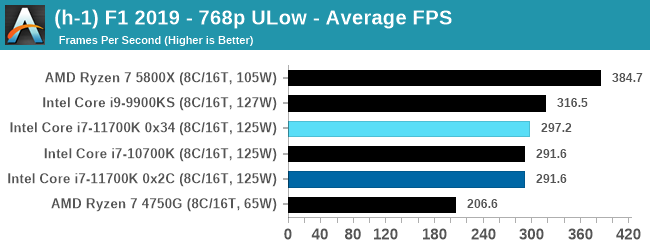 |
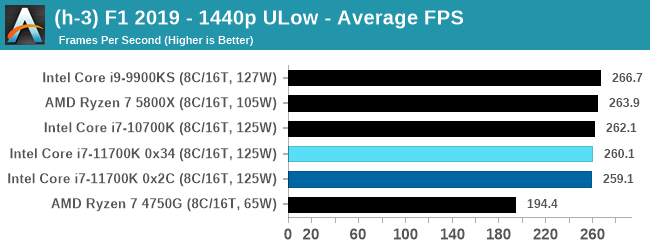 |
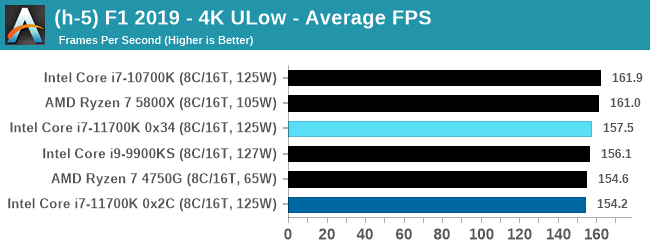 |
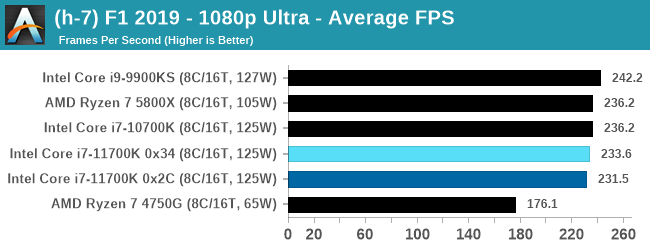 |
| 95th Percentile | 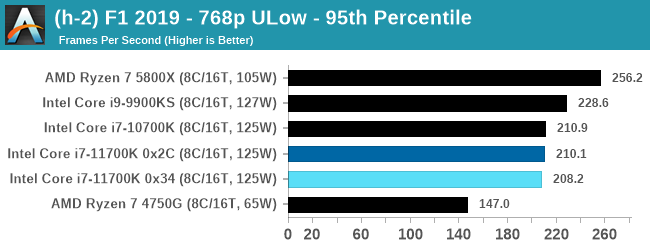 |
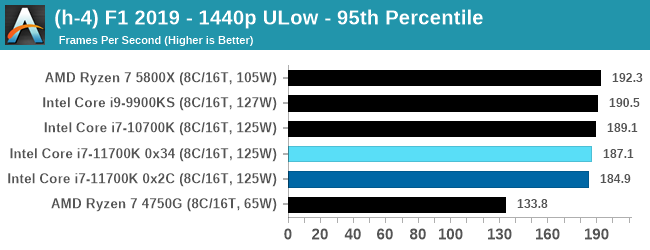 |
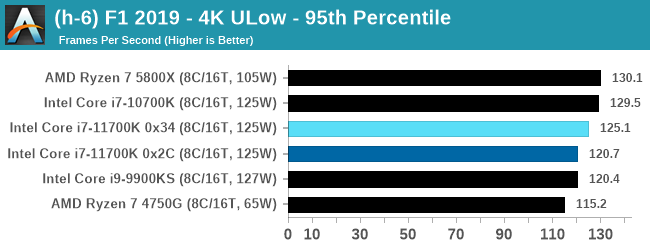 |
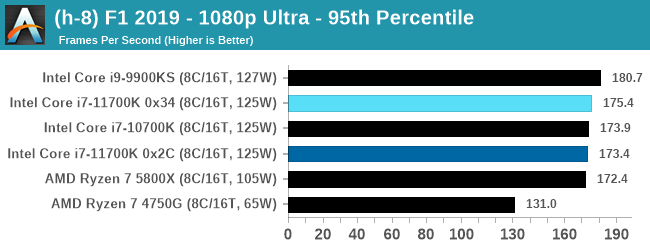 |
The Ego engine is usually a good bet where cores, IPC, and frequency matters. Despite this, the 11700K isn't showing much of a generational improvement.
All of our benchmark results can also be found in our benchmark engine, Bench.












541 Comments
View All Comments
nandnandnand - Friday, March 5, 2021 - link
Alder Lake on 10nm will fix everything, and be out before the end of the year.kgardas - Friday, March 5, 2021 - link
The power consumption you comment shows while using AVX512 on hand optimized test. Your idea about Alder Lake to solve this is not the correct one as Alder Lake itself will not implement AVX512 ISA at all. IMHO very bad decision by Intel again.TheinsanegamerN - Friday, March 5, 2021 - link
Yeah, some weak ant sized atom cores are what intel needs to fix this problem LOLnandnandnand - Friday, March 5, 2021 - link
You don't need more than 8 big cores for gaming. With a real IPC improvement, 8+8 should be able to beat the 5900X.lmcd - Friday, March 5, 2021 - link
Not likely, but it'll at least beat the 5800X and probably go even on efficiency. The real upside is in the server space and laptop space. I expect Alder Lake to do excellently in both of those segments.nandnandnand - Friday, March 5, 2021 - link
Alder Lake's Golden Cove cores should have a decent IPC improvement over Rocket Lake, so 8 of those cores should be able to match more than 8 Zen 3 cores. Then throw in the 8 Gracemont Atom cores which will be better than Tremont. 8+8 should top 5900X but not 5950X in multi-threaded, and beat Zen 3 in gaming.There's caveats, perhaps related to DDR5 or schedulers, but I will be surprised if the top Alder Lake chip can't beat the 5900X.
DigitalFreak - Friday, March 5, 2021 - link
Sorry, but in this case 8 + 8 does not equal 16.nandnandnand - Friday, March 5, 2021 - link
5900X is 12 cores, not 16. That's what Alder Lake 8+8 has a chance of beating.SaturnusDK - Saturday, March 6, 2021 - link
The problem is that Alder Lake has been pushed to second half of 2021 at the earliest so it will not be competing against Zen3 but Zen4.Pneumothorax - Saturday, March 6, 2021 - link
It might be able to beat the 5900x, but by the time you add in Intel's overpriced motherboards (have you looked at Z590's recently?!) and the premium of DDR5, you're going to be at 5950x+ pricing.